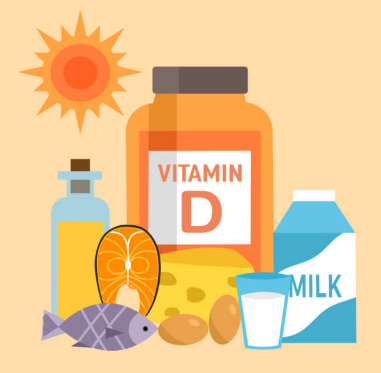When it comes to vitamin D for babies, you might believe that D stands for dilemma. Here’s the trick: Vitamin D is an essential nutrient for babies… The problem is that the preferred food source for newborns often doesn’t provide enough large doses of vitamin D. To make matters worse, the best source of vitamin D (aka sunlight) is a no-no for baby’s delicate skin! So, what should parents do? Let’s dive into vitamin D for babies: what is vitamin D, what are the best sources of vitamin D, and more.

Why Do Babies Need Vitamin D?
In the body, vitamin D helps absorb other minerals, such as calcium and phosphorus, which are important for the growth of your baby’s bones. It’s important for your baby to get enough vitamin D to help prevent certain health problems. Without enough vitamin D, they are at risk of rickets, a condition that causes bones to weaken and, in some cases, even deform. Although uncommon, it is possible to… And it’s a serious disease. Consuming moderate amounts of vitamin D may also help prevent some autoimmune diseases, certain infections, and even type 1 and type 2 diabetes. The American Academy of Pediatrics has changed the recommended daily vitamin D intake for infants under 1 year of age from 200 IU to 400 IU.
Why Are Babies at Risk of Vitamin D Deficiency?
An estimated 12% to 24% of infants are vitamin D deficient. While most adults can get vitamin D from sunlight, it’s not safe to expose the skin of sweet peas to intense sunlight. As a result, unlike adults, babies often don’t get the recommended levels of vitamin D through natural sunlight.
Still, even for us adults, certain conditions (long winters, excessive air pollution, and lots of clouds) and sun protection (clothing and sunscreen) can hinder our ability to absorb vitamin D from the sun! This poses a challenge for babies who rely on breast milk for nutrition, as parents with lower levels of vitamin D > lack vitamin D! If you’re breastfeeding, you may consider raising your own vitamin D levels. This is good for your overall health, but it may also increase the vitamin D levels in your milk. A billion people are unable to deliver enough amounts through breast milk. (Don’t feel guilty about that, though – there are about the world.)
Does My Baby Need Vitamin D Supplements?
Soon after your baby is born, they need a source of vitamin D. But breast milk, despite its many benefits for babies, is often deficient in this nutrient. If your baby drinks U.S.-made formula, you don’t have to worry too much about your baby not getting enough vitamin D. These formulas, like cow’s milk, are also rich in vitamin D to help your baby get enough vitamin D. However, young infants may not consume enough formula to meet their vitamin D nutritional needs. If your baby is breastfed/expressed only, or consumes less than 32 ounces of formula per day, your pediatrician will most likely recommend vitamin D supplementation.

Vitamin D comes in two forms: D2 (ergocalciferol) and D3 (cholecalciferol). D3 is the preferred form because it is easier to absorb and better absorbed in the body. Often, your child’s healthcare provider may recommend a multivitamin that contains vitamin D. If you decide not to take it, you can opt for a supplement that contains only vitamin D. These supplements are usually given via a dropper, which you can put directly into your baby’s mouth or add to a bottle of pumped breast milk.
What Foods Are Good Sources of Vitamin D?
Once your baby starts eating solid foods, they can get enough vitamin D from different foods including:
Whole fortified milk: It is not recommended to give milk to your baby before the age of one, but after the first birthday, whole milk is a good source of vitamin D for your 1-year-old.
Other fortified foods such as full-fat yogurt, cereals, and oatmeal
eggs and fish, such as canned light tuna or salmon
Can Babies Get Too Much Vitamin D?
As with other vitamins, there is always a small risk of overdose. You can’t overdose on the vitamin D in the sun because your skin can only produce so much. But you can give your baby too much through supplements. High doses of vitamin D may cause the following symptoms:
- Vomit
- Weak
- Pain
- Refusal to eat
- Dehydration
- Kidney stone
Infants under 6 months of age should not consume more than 1,000 IU of vitamin D per day. Infants aged 7 to 12 months should consume less than 1,500 IU of vitamin D per day.
As long as you follow vitamin D dosing instructions and follow your healthcare provider’s recommendations, you don’t need to worry about your baby getting too much vitamin D. To be on the safe side, consult your pediatrician before starting any vitamin D supplementation. Your child.
If you’re breastfeeding, talk to your doctor about how much vitamin D you can take to boost vitamin D levels for both you and your baby. Some breastfeeding parents choose to supplement with vitamin D in this way instead of providing vitamin D to their babies. Together, you and your child’s health care provider can decide what’s best for your family.
